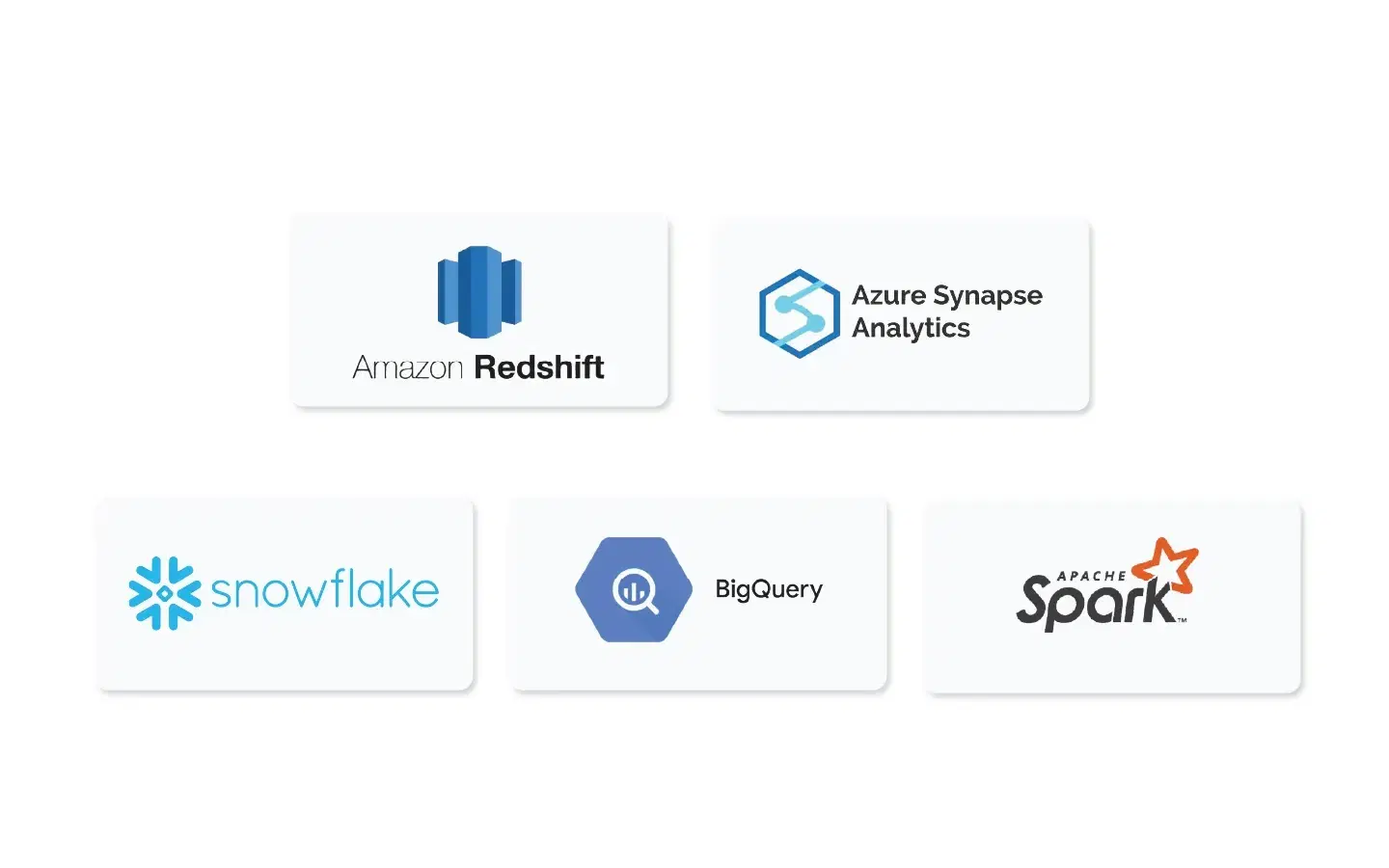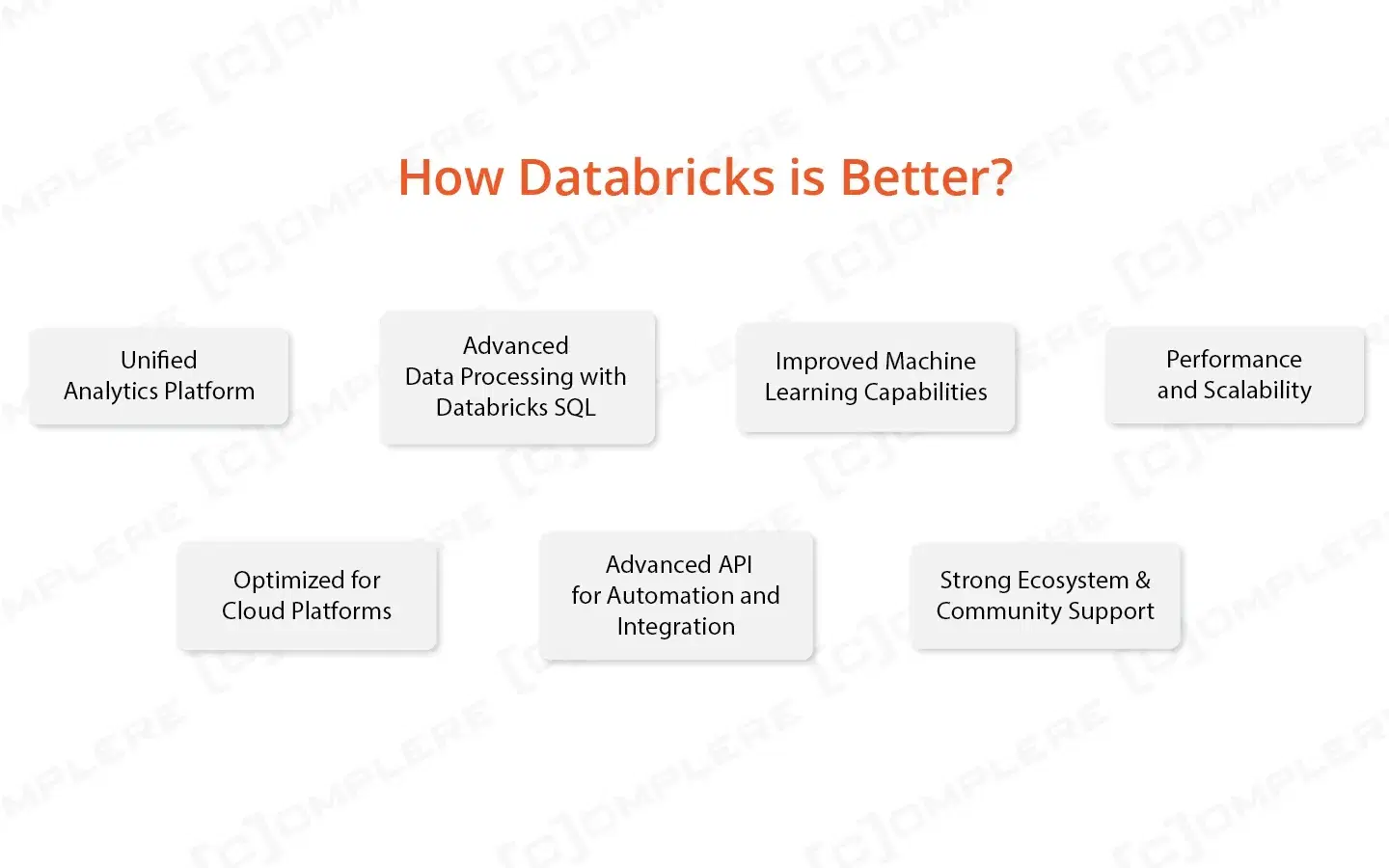Why Was Databricks Created and What Problems Does It Solve?
- Scale easily as data grows and can process and manage everything from small data sets to petabytes of data seamlessly.
- De-stress complex collaboration activities by enabling teams to collaborate all within a workflow, whether they are wrangling data, building models, or running advanced analytics.
- Integrate with the top public cloud providers (AWS, Azure, and Google Cloud) giving businesses flexible and user-friendly options for their enterprise data needs.
- Provide speed of delivery as organizations can quickly access raw data to measurable insights to business value faster than they ever have.
Why Knowing The Competition of Databricks Is Important?
Top 5 Competitors of Databricks

1. Snowflake
- It is a completely well-managed service with automatic scaling benefit.
- It supports both structured and semi-structured data.
- Databricks is known for advanced data sharing capabilities as well.
- Also, the strong security and data governance features provide efficient support.
How does Databricks compare to Snowflake?
How does Databricks compare to Snowflake in terms of technology focus and use cases?
The difference between Databricks and Snowflake is with their technology focus, and what types of projects they are best suited for.
2. Amazon Redshift
- High-performance query execution is one of the most preferred key features of Amazon Redshift.
- It provides flawless integration with other AWS services as well.
- You can enjoy its advanced security features to make sure that your data is secured.
- The last but not the least key feature of Amazon Redshift includes scalability and flexibility.
Are Databricks and Amazon Redshift the Same?
3. Google BigQuery
- Google BigQuery is known for its serverless architecture with automatic scaling.
- It also provides real-time data ingestion and analysis.
- Google BigQuery is supporting businesses through its integration with Google Cloud services.
- It has built-in machine learning capabilities.
Databricks vs Google BigQuery: Which One Fits Your Needs?
- Use Databricks when your primary needs lean towards advanced analytics, machine learning, and a unified data management layer for multiple types of data.
- Use BigQuery when your primary needs are fast and scalable data warehousing and analytics, including leveraging the power of Google Cloud.
4. Microsoft Azure Synapse Analytics
- Microsoft Azure Synapse Analytics provides you with unified data integration and analytics.
- You can use its real-time analytics on both operational and historical data.
- Another key feature is its integration with Azure Machine Learning and Power BI.
- Its scalable storage and compute resources can support your business growth.
Azure Synapse Analytics vs Databricks: Which Is Right for You?
- Azure Synapse Analytics is a unified analytics platform that combines SQL, Spark, data warehouse and data integration in one environment. If your team develops SQL-based workflows, does robust business intelligence reporting, or needs integrations to other Microsoft Azure tools/services, Synapse can simplify creating and managing workflows. Additionally, it has a familiar T-SQL interface that makes it accessible for users with SQL skills or those using Power BI for reporting.
- Databricks, built on top of Apache Spark, provides an environment specifically for data engineering, large scale ETL, machine learning, and advanced analytics. It is built to scale and can handle both structured and unstructured data. If your organization is focused on data science, real-time analytics, or requires high-powered Spark clusters for complex transformations, Databricks is probably a better option. Databricks collaborative notebooks are ideal for teams needing to work together to create complicated data pipelines.
- Select Azure Synapse Analytics if you want an all-inclusive analytics environment that integrates warehousing and big data analytics (particularly in an Azure based infrastructure).
- Select Databricks if your use-cases are primarily Spark-based analytics or sophisticated data science workloads.
5. Apache Spark
- In-memory data processing feature works so well.
- Another attractive and useful key feature of Apache Spark is that it supports multiple programming languages for example: Java, Scala, Python.
- It has a wide range of libraries for SQL, machine learning, and graph processing.
- High performance for both batch and simplified data.
What is the main advantage of using Apache Spark?

Key Features and Capabilities of Apache Spark
- In-Memory Processing: Apache Spark processes data in-memory which allows it to process analytics rapidly as compared to classical disk-based processing.
- Multi-Language Support: Developers can use multiple primary programming languages (like Java, Scala, Python and R) allowing teams to take advantage of existing skills and expertise.
- Unified Analytics Engine: Spark leverages a broad set of analytics (i.e. batch processing, real-time data streaming, machine learning and graph analytics) into one system.
- Fault Tolerance: Spark uses resilient distributed datasets (RDDs) to help protect data and provide the ability to recover lost data in the event of a lost node.
- Rich Ecosystem of Libraries: Spark provides a broad range of library support with built-in capabilities that address everything from SQL-based analytics, building machine learning algorithms called MLlib, graph analysis (GraphX), and real-time data processing called Spark Streaming.
How Databricks is Better Than Its Competitors?

1. Unified Analytics Platform
- Databricks integrates data engineering, data science, and machine learning into one platform.
- Teams can collaborate more effectively with a unified environment.
- Unlike competitors, it eliminates siloed environments.
2. Optimized for Cloud Platforms
- Azure and AWS Databricks are highly optimized for their respective cloud environments.
- Provides seamless integration with other cloud services for scalability and flexibility.
- Unlike competitors, Databricks excels with cross-cloud optimization.
3. Advanced Data Processing with Databricks SQL
- Databricks SQL is optimized for high-performance SQL analytics.
- Users can run complex queries on large datasets quickly.
- It outperforms traditional data warehouses with optimized execution plans.
4. Advanced API for Automation and Integration
- Databricks API enables task automation and easy integration with other tools.
- Offers high flexibility and extensibility compared to competitors.
- Perfect for businesses seeking to automate and streamline data workflows.
5. Improved Machine Learning Capabilities
- Supports the full machine learning lifecycle, from data prep to model monitoring.
- Integrated tools like MLflow simplify managing machine learning experiments.
- Unlike competitors, Databricks provides end-to-end machine learning support.
6. Performance and Scalability
- Powered by Apache Spark for fast, scalable data processing.
- Handles large datasets efficiently with in-memory processing.
- Databricks enhances Apache Spark’s capabilities with additional features.
7. Strong Ecosystem and Community Support
- Databricks benefits from a large ecosystem and an active community.
- Supported by extensive resources like documentation and tutorials.
- Collaborations with industry leaders to improve platform capabilities.














